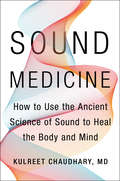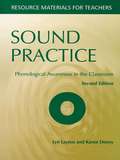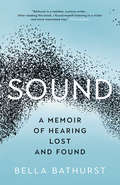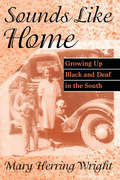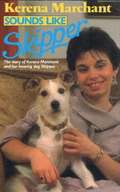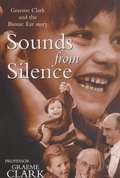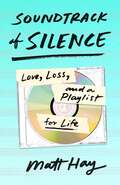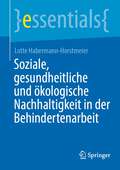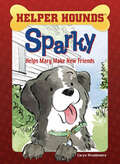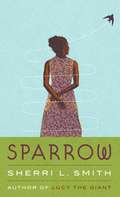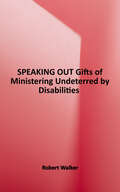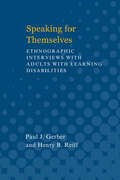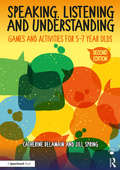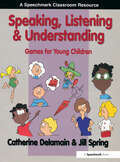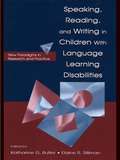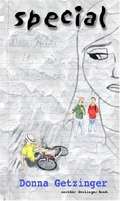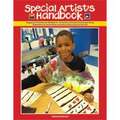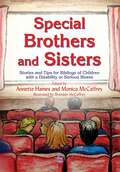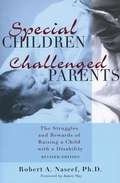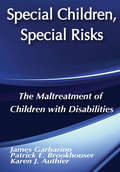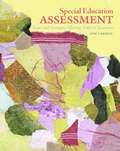- Table View
- List View
Sound Medicine: How to Use the Ancient Science of Sound to Heal the Body and Mind
by Kulreet Chaudhary M.D.From a leading neurologist, neuroscientist and practitioner of Ayurvedic medicine, comes a rigorous scientific investigation of the healing power of sound, showing readers how they can use it to improve their mental and physical wellbeing. Why does a baby’s cry instantaneously flood a mother’s body with a myriad of stress hormones? How can a song on the radio stir up powerful emotions, from joy to anger, regret to desire? Why does sound itself evoke such primal and deeply felt emotions?A vibration that travels through air, water and solids, sound is produced by all matter, and is a fundamental part of every species’ survival. But there is a hidden power within sound that has only just begun to be investigated. Sound Medicine takes readers on a journey through the structure of the mouth, ears, and brain to understand how sound is translated from acoustic vibrations into meaningful neurological impulses. Renowned neurologist and Ayurvedic expert Dr. Kulreet Chaudhary explains how different types of sound impact the human body and brain uniquely, and explores the physiological effects of sound vibration, from altering mood to healing disease.Blending ancient wisdom with modern science, Dr. Chaudhary traces the history of sound therapy and the use of specific mantras from previously unknown texts—traced back to the Siddhas, a group of enlightened yogis who created a healing tradition that served as the precursor to Ayurvedic medicine—to explain the therapeutic application of sounds for a wide range of conditions. Sound Medicine offers practical, step-by-step lessons for using music and mantras, whether you’re a beginner or searching for a more advanced practice, to improve your health in body, mind, and spirit.
Sound Practice: Phonological Awareness in the Classroom (Resource Materials For Teachers Ser.)
by Lyn Layton Karen DeenyThe second edition of Sound Practice looks afresh at how young children can be helped to discover basic facts about an alphabetic spelling system, within the context of their developing spoken language. It examines why children might fail to understand letter-sound links; the origins of severe and persistent difficulties with achieving functional literacy skills; and developmental processes underpinning the areas of learning identified in national initiatives for promoting children's learning. The book also discusses the need for differentiation strategies to respond to individual children's learning needs within national initiatives, and techniques and approaches that can be effectively applied to fulfil curriculum objectives. Phonological awareness is the key to independent literacy and must be explicitly tackled in the classroom in order to promote early reading and writing and to address written language difficulties in older children. This book is a suitable resource for initial and in-service training for teachers and teaching assistants and includes photocopiable worksheets.
Sound: A Memoir of Hearing Lost and Found
by Bella Bathurst&“A moving and fascinating book about sound and what it means to be human&” from the Somerset Maugham Award–winning author of The Lighthouse Stevensons (Financial Times). In this surprising and moving book, award-winning writer Bella Bathurst shares the extraordinary true story of how she lost her hearing and eventually regained it and what she learned from her twelve years of deafness. Diving into a wide-ranging exploration of silence and noise, she interviews psychologists, ear surgeons, and professors to uncover fascinating insights about the science of sound. But she also speaks with ordinary people who are deaf or have lost their hearing, including musicians, war veterans, and factory workers, to offer a perceptive, thought-provoking look at what sound means to us. If sight gives us the world, then hearing—or our ability to listen—gives us our connections with other people. But, as this smart, funny, and profoundly honest examination reveals, our relationship with sound is both more personal and far more complex than we might expect. &“Bathurst is a restless, curious writer . . . After reading this book, I found myself listening in a richer and more interested way.&” —The Guardian &“A hymn to the faculty of hearing by someone who had it, lost it and then found it again, written with passion and intelligence . . . terrifying, absorbing and ultimately uplifting.&” —Literary Review &“Bathurst&’s affecting memoir will enlighten and educate.&” —Publishers Weekly &“A memoir of hearing loss and what the author learned . . . through her unexpected recovery from it. A good writer knows material when it presents itself, and Bathurst is a very good writer.&” —Kirkus Reviews
Sounds Like Home: Growing Up Black and Deaf in the South
by Mary Herring WrightMary Herring Wright's memoir adds an important dimension to the current literature in that it is a story by and about an African American deaf child. The author recounts her experiences growing up as a deaf person in Iron Mine, North Carolina, from the 1920s through the 1940s. Her story is unique and historically significant because it provides valuable descriptive information about the faculty and staff of the North Carolina school for Black deaf and blind students from the perspective of a student as well as a student teacher. In addition, this engrossing narrative contains details about the curriculum, which included a week-long Black History celebration where students learned about important Blacks such as Madame Walker, Paul Laurence Dunbar, and George Washington Carver. It also describes the physical facilities as well as the changes in those facilities over the years. In addition, Sounds Like Home occurs over a period of time that covers two major events in American history, the Depression and World War II. Wright's account is one of enduring faith, perseverance, and optimism. Her keen observations will serve as a source of inspiration for others who are challenged in their own ways by life's obstacles.
Sounds Like Home: Growing Up Black and Deaf in the South
by Mary Herring WrightOriginally published in 1999, Sounds Like Home adds an important dimension to the canon of deaf literature by presenting the perspective of an African American deaf woman who attended a segregated deaf school. Mary Herring Wright documents her life from the mid-1920s to the early 1940s, offering a rich account of her home life in rural North Carolina and her education at the North Carolina School for the Deaf and Blind, which had a separate campus for African American students. This 20th anniversary edition of Wright’s story includes a new introduction by scholars Joseph Hill and Carolyn McCaskill, who note that the historical documents and photographs of segregated Black deaf schools have mostly been lost. Sounds Like Home serves “as a permanent witness to the lives of Black Deaf people.”
Sounds Like Skipper: The Story of Kerena Marchant and Her Hearing Dog Skipper
by Kerena Marchant<P>Skipper is a shaggy-haired Jack Russell, one of the earliest dogs trained in a new scheme to help people suffering from deafness. The author, a permanent researcher for BBC TV, has been deaf since infancy. Modern technology can equip her with a special high-powered hearing aid, but Skipper enables her to live alone, summoning her to doorbells and telephones, waking her when the alarm rings, and warning her of such unexpected hazards as burglars or fire alarms. The author's story of life with Skipper is full of insights into the plight of the deaf in contemporary society. <P>Kerena tells her story of how she received Skipper a Jack Russell terror mix dog, and how his presence changed her life. She also discusses some problems that she experienced as a almost deaf person in a hearing world, and her experiences with the deaf community too.
Sounds from Silence: Graeme Clark and the Bionic Ear Story
by Graeme ClarkThe author's interest in the development of improved hearing devices for the deaf arose from his interactions with his own father, who lost his hearing. Having worked in a pharmacy, Graham Clark developed a keen interest in pursuing a medical degree. His research and tenacity led him to develop the multiple contact bionic ear. The book takes us on a journey with the author through his life and his perseverance to develp this device.
Soundtrack of Silence: Love, Loss, and a Playlist for Life
by Matt HayAn inspiring memoir of a young man who discovered he was going completely deaf just at the moment he’d fallen in love for the first time.As a child, Matt Hay didn’t know his hearing wasn’t the way everyone else processed sound—because of the workarounds he did to fit in, even the school nurse didn’t catch his condition at the annual hearing and vision checks. But by the time he was a prospective college student and couldn’t pass the entrance requirements for West Point, Hay’s condition, generated by a tumor, was unavoidable: his hearing was going, and fast.A personal soundtrack was Hay’s determined compensation for his condition. As a typical Midwestern kid growing up in the 1980s whose life events were pegged to pop music, Hay planned to commit his favorite songs to memory. He prepared a mental playlist of the bands he loved and created a way to tap into his most resonant memories. And the track he needed to cement most clearly? The one he and his new girlfriend, Nora—the love of his life—listened to in the car on their first date.Made vivid with references to instantly recognizable songs—from the Eagles to Elton John, Bob Marley to Bing Crosby, U2 to Peter Frampton—Soundtrack of Silence asks readers to run the soundtrack of their own lives through their minds. It’s an involving memoir of loss and disability, and, ultimately, a both unique and universal love story.
Soziale, gesundheitliche und ökologische Nachhaltigkeit in der Behindertenarbeit (essentials)
by Lotte Habermann-HorstmeierUm Menschen mit geistiger Behinderung ein nachhaltiges, gesundes Leben zu ermöglichen, braucht es eine nachhaltig gesundheitsfördernde Lebenswelt, die in ein gesundes Ökosystem eingebettet ist, sowie eine sie tragende Gesellschaft, die das Wohl aller Menschen und die Unversehrtheit ihrer natürlichen Umwelt im Blick hat.
Space and Self: Active Learning by Means of the Little Room
by Lilli NielsenIn 1980 Dr. Nielsen, a Danish educator, was asked to evaluate a 20-month-old blind boy who was severely developmentally delayed. Her observations of this child helped her formulate ideas that led to her creation of the "Little Room", a structured environment through which blind children can learn to explore their surroundings. Nielsen's approach is known as "active learning," as the child becomes motivated to experiment and explore when his surroundings are interesting and when he/she is free from adult interference. This book is packed with specific suggestions for parents and teachers, and gives a detailed explanation of the "Little Room" and how it should be used.
Sparky Helps Mary Make Friends (Helper Hounds)
by Caryn RivadeneiraMary's new in town. She’s worried about starting classes at her new school. That's why her mom calls the Helper Hounds—and why Sparkplug, the wildly handsome, wickedly smart, card-carrying, world-famous Helper Hound is on the scene. Sparky knows a thing or two about moving. He moved four times as a puppy, and learned to make new friends along the way. Sparky knows he can teach Mary all his best tricks and help her meet new friends, too. At least Sparky thought he could until he met Custard, Mary's persnickety cat. Will Sparky's best tricks be enough to win over Custard and show Mary making friends is nothing to fear?
Sparrow
by Sherri L. SmithFamily sticks with family. That’s the golden rule G’ma taught Kendall. But once G’ma’s gone, Kendall has no family left—except for an aunt G’ma asked for at the end, who Kendall barely remembers. Only Aunt Janet knows what G’ma had in mind, but she never even shows up at the funeral. With child services on Kendall’s case and just 10 days to get her apartment lease renewed, Kendall sets out for Janet’s home in New Orleans to get her life in order—and her questions answered. But what she finds are ne...
Speak Up!
by Rebecca BurgessFor fans of Click and Brave, this touching coming-of-age middle grade graphic novel debut follows an autistic girl who finds friendship where she least expects it and learns to express her true self in a world where everyone defines her by her differences.Twelve-year-old Mia is just trying to navigate a world that doesn’t understand her true autistic self. While she wishes she could stand up to her bullies, she’s always been able to express her feelings through singing and songwriting, even more so with her best friend, Charlie, who is nonbinary, putting together the best beats for her.Together, they've taken the internet by storm; little do Mia’s classmates know that she’s the viral singer Elle-Q! But while the chance to perform live for a local talent show has Charlie excited, Mia isn’t so sure.She’ll have to decide whether she’ll let her worries about what other people think get in the way of not only her friendship with Charlie, but also showing everyone, including the bullies, who she is and what she has to say.
Speaking Out: Gifts of Ministering Undeterred by Disabilities
by Edited by Robert L. WalkerReaders of "Speaking Out: Gifts of Ministering Undeterred by Disabilities" will enter the worlds of one Episcopal and 24 United Methodist ministers who cope with various forms of disabilities. Read how each one is a living testimony that will surprise, inspire, and remind you that they are people with God-given gifts who were spiritually strengthened during their individual life journeys, all the while remaining faithful to their respective calls to church ministry. <p><p>Unfortunately, people with disabilities frequently experience physical and discriminatory barriers, several of which are described by the contributors to this book; undeterred, they overcame or are overcoming the barriers through grace, resiliency, and support from many sources. The book focuses on ministers, but their stories are applicable to non-ministerial persons in our all too common negating ways of both the sacred and secular societies. <p><p>This book is sponsored by the United Methodist Association of Ministers with Disabilities (UMAMD), and all royalties from sales of the book will go to the UMAMD in support of its activities.
Speaking for Themselves (International Academy For Research In Learning Disabilities Monograph Series #9)
by Henry B. Reiff Paul J. GerberSpeaking for Themselves: Ethnographic Interviews with Adults with Learning Disabilities by Paul J. Gerber and Henry B. Reiff investigates the personal and academic experiences of adults diagnosed with learning disabilities. Taking an ethnographic approach, the authors present in-depth interviews with nine adults, aged 22 to 56, exploring how their learning disabilities affect various aspects of their lives, such as education, vocational achievement, social and emotional adjustment, and daily living skills. The study categorizes subjects into three groups based on educational and vocational achievements: high, moderate, and marginal adjustment to adulthood. Through personal narratives, the book reveals the nuances of struggle and success in this often-overlooked adult demographic, offering valuable insights for researchers, educators, and policymakers. Particularly, it emphasizes the need for a better understanding of the challenges and needs faced by adults with learning disabilities, while calling for the expansion of personalized and effective support systems beyond childhood and adolescence into adult life. The findings highlight a significant variance in experiences, illustrating that the degree of success in adulthood often correlates with educational attainment and the ability to compensate for learning challenges. This research asserts the importance of inclusive practices and further studies to continue improving the quality of life and support for adults with learning disabilities.
Speaking, Listening and Understanding: Games and Activities for 5-7 year olds (The Good Communication Pathway)
by Catherine Delamain Jill SpringSpeaking, Listening and Understanding is a practical resource packed full of games to improve young children’s communication skills. The second edition of this bestselling resource contains a programme of games and activities to foster the speaking, listening and understanding skills of children aged from 5 to 7 years. The book seeks to address language and communication difficulties for primary-aged children by providing a range of fun and engaging activities. Suitable for whole classes or small groups of children, the activities focus on both understanding and using language in areas such as following instructions, thinking skills, inference, describing, narrating and playing with words. Features include: 160 games and activities which are differentiated by stages and levels of ability; A clear aim, equipment list and instructions for each activity; Photocopiable templates for ease of use; Supplementary resource sheets including pictures and scripts to use with the activities. Now fully revised and updated in line with current policy and legislation, this book is suitable for young children in any school setting. It also includes material that may be used as an effective part of a speech and language therapy programme in consultation with a therapist. This is a unique manual that will be an essential addition to the materials used by professionals working with young children.
Speaking, Listening and Understanding: Games for Young Children (The\good Communication Pathway Ser.)
by Catherine Delamain Jill SpringWritten by two experienced speech language therapists, who have worked extensively alongside mainstream teachers, this book provides activities that are both teacher and child friendly. It contains a collection of graded games and activities designed to foster the speaking, listening and understanding skills of children aged from 5 to 7. The activities are divided into two main areas: Understanding Spoken Language: Following Instructions; Getting the Main Idea; Thinking Skills; Developing Vocabulary; Understanding Inference. Using Spoken Language: Narrating; Describing; Explaining; Predicting; Playing with Words. Each activity has a clear aim, simple instructions, and requires minimal equipment. Activities may be carried out by teachers, classroom assistants or volunteers. Incorporates user-friendly opportunities for assessment, target setting and evaluation. Includes photocopiable material to support the activities. "Many of the activities can be used by speech language therapists, and the book can be used as an effective part of a speech and language programme. Promotes the skills outlined in Speaking and Listening in the English National Curriculum Key Stage One.
Speaking, Reading, and Writing in Children With Language Learning Disabilities: New Paradigms in Research and Practice
by Elaine R. Silliman Katharine G. ButlerThe ability to use language in more literate ways has always been a central outcome of education. Today, however, "being literate" requires more than functional literacy, the recognition of printed words as meaningful. It requires the knowledge of how to use language as a tool for analyzing, synthesizing, and integrating what is heard or read in order to arrive at new interpretations. Specialists in education, cognitive psychology, learning disabilities, communication sciences and disorders, and other fields have studied the language learning problems of school age children from their own perspectives. All have tended to emphasize either the oral language component or phonemic awareness. The major influence of phonemic awareness on learning to read and spell is well-researched, but it is not the only relevant focus for efforts in intervention and instruction. An issue is that applications are usually the products of a single discipline or profession, and few integrate an understanding of phonemic awareness with an understanding of the ways in which oral language comprehension and expression support reading, writing, and spelling. Thus, what we have learned about language remains disconnected from what we have learned about literacy; interrelationships between language and literacy are not appreciated; and educational services for students with language and learning disabilities are fragmented as a result. This unique book, a multidisciplinary collaboration, bridges research, practice, and the development of new technologies. It offers the first comprehensive and integrated overview of the multiple factors involved in language learning from late preschool through post high school that must be considered if problems are to be effectively addressed. Practitioners, researchers, and students professionally concerned with these problems will find the book an invaluable resource.
Special
by Donna GetzingerSpecial is based on Getzinger's own experiences as the younger sister of a Learning Disabled boy. This story is very close to her heart, and she hopes that everyone who reads this book will learn to love and accept the unique-ness of people like her brother the way that she has.
Special Artist's Handbook: Engaging Art Activities For Special Needs Including Autism Spectrum Disorder, Second Edition
by Susan RodriguezThe Special Artist's Handbook is an art activities reference manual for art teachers, special education teachers, art teachers, classroom teachers, recreational therapists, parents, and anyone who is involved with the education of exceptional children.
Special Brothers and Sisters: Stories and Tips for Siblings of Children with Special Needs, Disability or Serious Illness
by Annette Hames Monica MccaffreySpecial Brothers and Sisters is a collection of real-life accounts from the brothers and sisters of children with special needs, disability or serious illness, ranging in age from 3 to 18 years. They explain, in their own words, what it's like to live with their siblings. There is a lot of advice available for parents of a child with a disability or illness, but very little about the important issue of educating their siblings about how they feel, and why they may behave differently from other children. These stories - from 40 different families - come with related tips to help siblings deal with some of the things that happen in their family lives. The book also provides a helpful glossary to explain, in child-friendly language, the disabilities and medical conditions mentioned, including: * ADHD * autism * cerebral palsy * cystic fibrosis * Down syndrome Special Brothers and Sisters is an engaging and educational collection that will enable young people and adults to share in the extraordinary experience of being a sibling of a child with special needs, a disability or serious illness.
Special Children, Challenged Parents: The Struggles and Rewards of Raising a Child with a Disability
by Robert NaseefRaising children with special health care or developmental needs is uniquely so. At times, the challenges seem overwhelming and even oppressive.
Special Children, Special Risks: The Maltreatment of Children with Disabilities (Modern Applications Of Social Work Ser.)
by James Garbarino Patrick E. Brookhouser Karen J. AuthierHow does one investigate a child maltreatment case when the victim is blind, mute, deaf, mentally retarded, or confined to an institution? Special Children, Special Risks presents analysis, recommendations, and related research from social work, psychology, psychiatry, medicine, and education essential for establishing and maintaining safe environments for handicapped children.This book brings together a diverse group of experts to pool their knowledge and share their concerns about the risks of abuse faced by handicapped children. The contributors' perspectives come from the fields of medicine, social work, developmental psychology, psychiatry, clinical psychology, education, child welfare, law, public policy, and journalism.
Special Education Advocacy
by Ruth Colker Julie K. WaterstoneAn edition that uses the advocacy approach to develop a set of materials of teaching children in the special education sector. This book presents the major principles to successful advocacy on behalf of special needs children by using meaningful real life experience.
Special Education Assessment: Issues and Strategies Affecting Today's Classrooms
by Effie KritikosWith a strong emphasis on diversity, this robust and practical book offers current teachers and pre-service teachers alike an eye-opening and clear exploration of current formal and informal assessment tool analysis with respect to accommodations, modifications, legal and technology matters. Real-life case studies are incorporated into each chapter, helping readers to hone their decision-making skills and to understand how the chapter material relates to practical applications. At the same time, break point practices, illustrations of assessment tools, and website references provide students with multiple opportunities for self-assessment, higher-level analysis and classroom applications.
